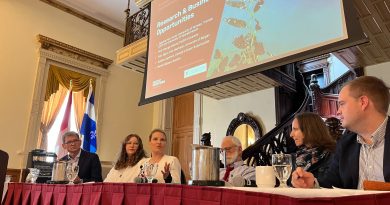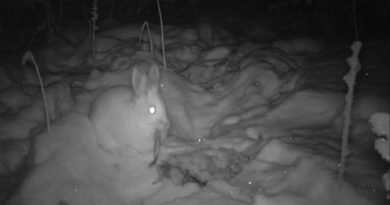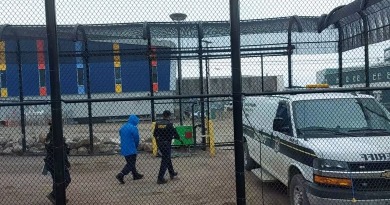Blog: Arctic Circle—The outside world keeps walking in
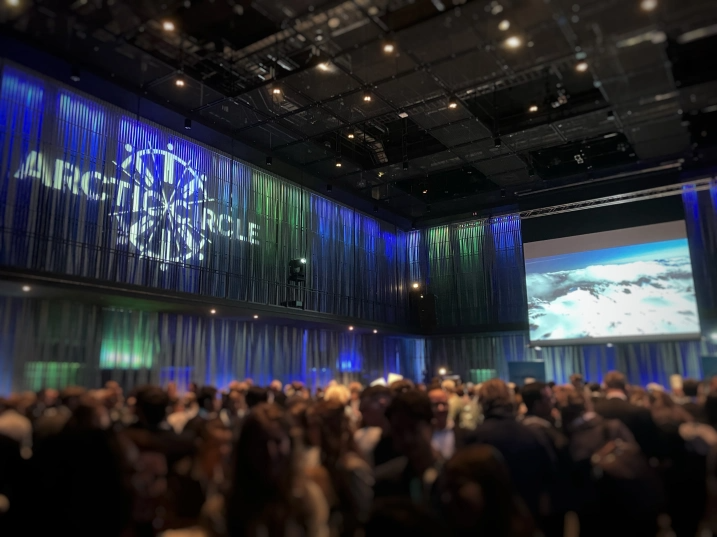
This year’s Arctic Circle Assembly was a near-return to normal operations following previous postponements and restrictions due to the coronavirus pandemic.
Yet the event could hardly be called ‘business-as-usual’, in the penumbra of the Russian invasion of Ukraine and its global effects, including in the far north. Russian participation in the conference this year was almost non-existent, while military security concerns in the Arctic were a common theme amongst many panels as the overall shape of Arctic security continues to be redefined.
During a speech by Admiral Robert Bauer, Chair of NATO’s Military Committee, in one of the final plenaries of the event, the Ukraine conflict was directly connected to the Arctic, especially as Finland and Sweden were preparing to join the alliance. ‘And soon,’ the Admiral concluded [video], ‘with seven out of eight Arctic states being part of this great alliance, we will do everything we can to make sure the Arctic remains free and open’. In fact, the current geostrategic situation in the far north is now at high risk of going in the opposite direction.
Two inconvenient truths about the current political state of the Arctic which were reflected in the conference this year. First, any vestiges of ‘exceptionalism’ in the region, meaning the Arctic could be effectively separated from outside security concerns, had entirely vanished. Second, the definition of ‘Arctic security’ continues to become more multifaceted in light of the Ukraine conflict, with Russian and NATO interests resulting in more direct policy conflicts in northerly latitudes.
The hardening of security interests in the Arctic had been reflected earlier this month in Washington’s regional policy paper, ‘National Strategy for the Arctic Region’ [pdf], which sought to rebalance American Arctic policies following the aggressively one-dimensional approach to the region pursued by President Joe Biden’s immediate predecessor.
The strategy consisted of four pillars in defining US Arctic diplomacy, namely security, (protection of the United States and its allies in the Arctic), addressing climate change (with extensive participation from Alaska in developing strategies for mitigation and resilience), sustainable development, (including regional infrastructure and services), and international cooperation and governance, (working with the Arctic Council and ‘Arctic Allies’ to maintain regional regimes). In August this year, the Biden administration also confirmed its interest in appointing an Arctic Ambassador-at-Large. These policy shifts, including the four pillars and how they may fit into larger questions of Arctic cooperation and strategies, were also discussed at length during the Arctic Circle.
Future of Arctic governance?
One common theme expressed by the panels was that while the Arctic Council is still officially ‘on pause’, work by the membership, minus Russia, was continuing. Yet it remains to be seen whether critical work on addressing the main security challenge in the far north, namely climate change, could effectively continue under current circumstances. Moreover, there was much side discussion about the future of Arctic governance should the divide between the ‘Russian’ and ‘Western’ Arctics drift towards permanence.
Although Russia’s attack on Ukraine did cast a shadow on the Arctic Circle’s deliberations, several other themes were front and centre at the event, including Indigenous concerns. In her first speech to the assembly, Mary Simon, Governor-General of Canada, from Kangiqsualujjuaq, Québec, and the first Indigenous person to hold that office, discussed [video] the challenges of creating ties amongst Arctic communities and the effects of warming conditions in the north. As well, she spoke about the ongoing campaign by Arctic peoples to ‘advocate for the space and autonomy they need to claim and revitalise culture, language, and knowledge systems’, including in the Canadian North.
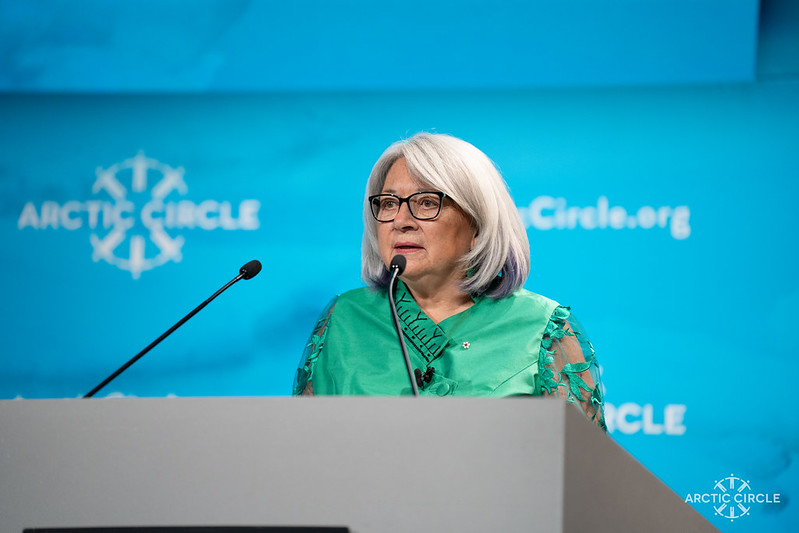
Greenland’s Prime Minister, Múte B. Egede, struck a similar tone, as he spoke about ongoing Greenlandic interests in greater international visibility, but that also any dialogue about Greenland must be on Greenlandic terms: ‘nothing about us, without us’ [video]. This stance reflected the fact that Greenland continues to be courted by international actors, especially as interest in the island’s rare earths continues, and that Nuuk remains committed to expanding its foreign policy footprint as it moves towards potential independence from the Kingdom of Denmark.
Relations between Arctic and non-Arctic states on northern affairs
Another question about the near-future of the Arctic which generated attention at the conference concerned the ever-complicated relationship between Arctic governments and the growing list of non-Arctic states and organisations seeking a more robust participation in far northern policymaking. The Arctic Circle had frequently served as a showcase for actual and potential observer countries to showcase their regional interests, and on occasion release new policy documents and strategies. This year was no exception, but with the Arctic Council still in abeyance, questions about of the role of observers, (and whether there were any means of appointing new ones to the Council next year), were thrown into much sharper relief.
Amongst the current observer governments in the Council, China by far continues to receive the most global attention due to its size, economic weight, and ongoing debates over how the country’s interests in the Arctic are evolving in light of vastly more difficult strategic conditions in the region compared with nearly five years ago when Beijing published its own White Paper on governmental Arctic policy.
China’s ongoing interest in North
Participation by Chinese officials and specialists was more visible at the conference this year, although some presentations were virtual in light of ongoing travel restrictions related to Beijing’s ‘zero-Covid’ policies. The PRC Foreign Ministry’s Special Representative for Arctic Affairs, Gao Feng, spoke in person about his country’s ongoing interests in the far north, but his speech received additional attention as he deferred the question of whether China would continue to engage the Arctic Council if Moscow remained excluded from its deliberations. He also gave a candid response to a question about whether the Chinese People’s Liberation Army had any role in the Arctic. The response was ‘in theory, yes’, given that China was also a member of the United Nations Security Council, but he also stressed that there were no PLA forces currently in the Arctic, rumours notwithstanding.
After Admiral Bauer completed his speech, he was challenged [video] in the question period by Chinese Ambassador to Iceland He Rulong, who took exception to the NATO official’s remarks on how China along with Russia had become anathemas to the ‘rules-based international order’ in the Arctic. The room became even more animated as the Admiral then directly asked the Ambassador to explain why Beijing had yet to condemn Russia’s invasion of Ukraine. Not only was the exchange an example of competing narratives, but it also illustrated another inconvenient truth: that worsened relations between America and China were spilling over into matters of Arctic governance, whether the Arctic itself wished it or not.
In a way, the arrival of Sino-American competition into the Arctic echoes similar concerns raised earlier this year in the Pacific Islands, namely that great power politics may soon overshadow environmental security threats seen as far more pressing to local communities.
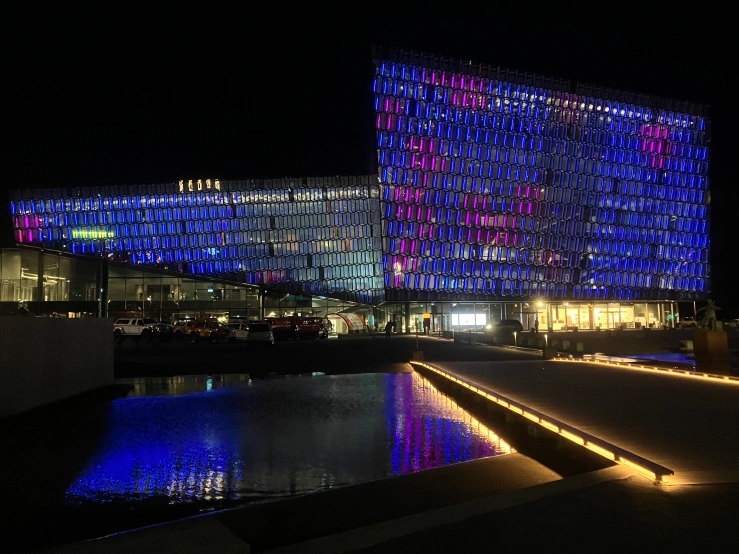
Several other non-Arctic states were also visible during the assembly’s events, including science panels organised by specialists in Estonia and Ireland, two states which are currently seeking formal observer status in the Council. Estonian president Alar Karis was also a keynote speaker [video] at the event, reflecting on the indistinct lines between Arctic and ‘Arctic-adjacent’ states. The president, noting that Estonia’s status as the ‘northernmost capital below the Arctic Circle’ spoke about three key factors of the region which are also relevant to Estonian interests: human security and the environment in the wake of climate change, the specific contributions which Estonia can make to the Arctic, (including the country’s long history of polar research, specially in environmental studies including in Svalbard, and approaches to sustainable development), and the effects of ‘hard security’ and the war in Ukraine on the far north.
India, Singapore and Japan
Representatives from Japan were also involved in discussions about scientific diplomacy in the Arctic, and during the assembly it was formally announced [video] that the Arctic Circle Forum in Tokyo would take place in March of next year, (another forum, to be held in Abu Dhabi on the ‘Third Pole’ and Himalayan geographical studies in relation to the Arctic, is also in preparation, and a forum in Berlin was also confirmed for 2025). Representatives from India also used the assembly as a stage to introduce their own recently published Arctic policy paper [pdf].
Singapore, which has often been an active participant in Arctic Track II events despite its decidedly non-polar geography, was discussed [video] during the opening plenaries by the country’s Senior Minister of State – Ministries of Foreign Affairs and National Development, Sim Ann. She explained her country’s expanding Arctic interests as being defined byconcerns over Arctic climate change and the effects of sea level rise on the low-lying island nation, as well as the potential for scientific and technological cooperation between Singapore and Arctic states. In taking questions [video], the Senior Minister added that Singapore’s role as an observer remained crucial despite the pause, given continuing climate change threats, and expressed hopes that dialogue on environmental challenges could be maintained and that a balance could be struck between the global and local aspects of the region.
As is now tradition at the assembly, awards were presented near the conclusion of the event, with this year’s Frederik Paulsen Arctic Academic Action Award being given to Professor Hanne H. Christiansen and Associate Professor Marius Jonassen of the Svalbard-based PermaMeteoCommunity project which has sought to build an advanced system to monitor climate chance and permafrost conditions in the far north. The Arctic Circle Prize, which had previously been awarded to former UN Secretary-General Ban Ki-moon (2016) and former US Secretary of State John Kerry (2019), was presented this year to representatives of the German Alfred Wegener Institute for their launch of the MOSAiC Expedition in the Arctic by the research vessel RV Polarstern during 2019-20.
This year’s assembly was estimated to have welcomed over two thousand participants, reflecting ongoing regional and international interest in the Arctic. Discussion about the far north, however, continues to enter new and unexpected territories as external political and security interests attempt to side-door their way into the region. To reverse an often-quoted phrase at the event, what happens outside of the Arctic no longer stays outside of the Arctic.
Related stories from around the North:
Canada: Canada’s North spared from national military staff shortages, CBC News
Faroe Islands: Faroe Islands’ Arctic strategy focuses on security, climate & cooperation, Eye on the Arctic
Finland: No return to pre-war reality when it comes to Arctic cooperation, says Finnish rep, Eye on the Arctic
Greenland: Greenland, Iceland sign cooperation agreement in Reykjavik, Eye on the Arctic
Iceland: Canada’s GG among keynote speakers at Arctic Circle Assembly, Eye on the Arctic
Norway: Hybrid threat researcher detained in Tromsø on suspicion of being Russian agent, Thomson Reuters
Russia: Newly deployed nuke-bombers at Kola is certainly a signalling, expert says, The Independent Barents Observer
United States: China, Russia among global priorities, including in Arctic, in U.S. security strategy, Eye on the Arctic

